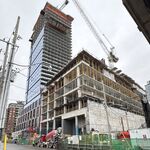If this article is any indication, rental rates here might increase.
http://www.theglobeandmail.com/repo...ught-by-rental-credit-squeeze/article4392820/
Americans caught by rental, credit squeeze
One night last spring, David Hall returned home to his studio apartment outside Boston to learn that his monthly rent had spiked from $725 (U.S.) to $995.
It would be much cheaper for the maintenance manager to buy a nearby starter house than to stay put. But his mortgage broker told him that while his credit score was good, it was not high enough to meet banks’ tough standards, he said.
“I know if I walk into a bank, they are just going to laugh at me,” Mr. Hall says. “So I’m stuck.”
He is not alone.
Five years after the housing bubble burst, the United States is in the midst of a housing affordability crisis. Home prices have fallen a third from their peaks, but many Americans cannot benefit because they cannot get a mortgage.
With credit tight, many consumers have no choice but to rent. Others who can afford to buy are also renting, because they view real estate as a lousy investment. As demand has increased, rents in some cities have jumped by double-digit percentage rates.
Rents rose 1 per cent to record highs in the second quarter from the prior period, according to real estate research firm Reis.
Just 4.7 per cent of U.S. apartment units are vacant, the lowest level since the fourth quarter of 2001. Low vacancies are likely to push rents even higher, Reis said.
People with lower incomes have long struggled to find affordable housing, but many in the middle class are now hurting, too.
Most personal finance experts recommend allocating no more of 30 per cent of family income to housing, but nearly 40 per cent of Americans are paying more than a third, according to the U.S. Census Bureau’s American Community Survey.
In New York City, one-third of households are spending more than half their pay on rent.
“We have falling incomes, rising rents and nothing but substantial upward pressure on those rents,” says Chris Herbert, director of Harvard University’s Joint Centre for Housing Studies. “And nothing in the cards suggests it will turn around anytime soon.”
Today’s housing market is a buyer’s paradise.
It is now cheaper to buy a home than it is to rent in virtually every major city in the United States, according to John Burns Real Estate Consulting.
But for many in the renter class, buying even a modest home is impossible because financing is so hard to secure.
Lending for home purchases hit a 12-year low of $404-billion last year, down from $1.4-trillion in 2006, according to trade publication Inside Mortgage Finance. That means mortgage credit is tighter than it was even before the housing boom.
This year, lending is expected to drop even more, according to Inside Mortgage Finance.
A recent Morgan Stanley research report states that the average credit score is 762 for a consumer securing a mortgage backed by government-sponsored enterprises like Fannie Mae. But 65 per cent of Americans have scores below 750.
In other words, a disproportionate number of mortgages are going to people with unusually good credit. A perfect score is 850, and anything below 660 is considered subprime.
“Basically, access to credit for borrowers with less than spotless credit is severely limited,” the Morgan Stanley report states. “A good chunk” of U.S. households are “cut off from mortgage credit on this count alone.”
For people who can get mortgages, rates are at their lowest levels in several generations. Add that to the cheap home prices, and houses are at their most affordable since at least 1970, when the National Association of Realtors began tracking this metric.
Normally, high affordability translates into higher sales. And the housing market is showing some signs of recovery – the S&P/Case Shiller index of home prices had its third consecutive monthly gain in April. Last week, the NAR said pending home sales had matched a two-year high in May.
But any recovery has been tepid. The NAR said existing home sales had declined 1.5 per cent to a seasonally adjusted annual rate of 4.55 million in May from 4.62 million in April. That is 34.2 per cent above the July, 2010, bottom of 3.39 million, but far short of the 5.5 million pace that the NAR considers healthy.
“Home sales have just barely picked up from their cyclical lows, and that’s because there are still constraints to borrowing,” said Moody’s Analytics economist Celia Chen.
Part of the lender pullback has to do with the stringent regulations Washington put in place after the housing crash, says Michael Fratantoni, vice-president of the Mortgage Bankers Association. These rules put more of the losses from bad mortgages onto lenders, instead of investors or government-sponsored enterprises.
Then there is the climate of unstable home prices and a shaky labour market: “There’s a risk that even a borrower with moderately good credit may fall behind,” Mr. Fratantoni says.
Consumers who cannot buy must rent, and that is where many Americans are feeling the pressure. A rent index from real estate data provider Zillow shows year-over-year gains for 70 per cent of the U.S. metropolitan areas, while its home value index rose in only 7.3 per cent.
In the 12 months ended in May, rents rose 14 per cent in San Francisco and 11 per cent in San Jose, Calif., according to Zillow. Last year in Minneapolis, they spiked 11 per cent even as home values sank 8 per cent.
Only a few years ago, landlords in cities like San Francisco and New York were tossing in a month or two of free rent, sometimes with parking, to lure tenants into signing leases.
Today, applicants are showing up at apartment viewings with copies of their unblemished credit reports and letters of recommendation from bosses and prominent friends, in the hopes of snatching up a place to rent.
Equity Residential, one of the biggest apartment owners in the United States, has more renters with high credit scores than ever, vice-president of operations David Santee said on an April conference call with analysts.
Demand for apartments is also higher because many potential buyers in their 20s and 30s want to stay flexible – home ownership is not as attractive as it was to earlier generations.
Still, plenty of people would prefer entry into the ownership class.
Last spring Rosemary Wynder, a physician order specialist, found her rent shooting up. She decided to buy a house.
But a bank glitch in February had caused one late car loan payment, dinging her credit score. The Utica, N.Y., resident has been unable to straighten out the mistake, and five banks have rejected her for a mortgage.
“I’ve been crying,” says Ms. Wynder. “I’ve been praying.”




